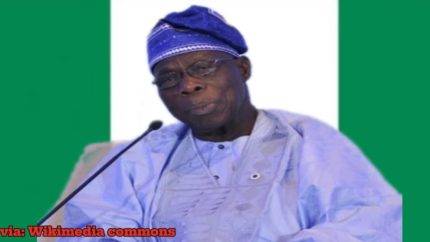Former President Obasanjo Raises Alarm Over Nigeria’s Crude Oil Theft
Former President Olusegun Obasanjo’s recent pronouncements have ignited a firestorm of debate surrounding Nigeria’s economic landscape, particularly its vulnerability to the rampant theft of crude oil. With stark candor, Obasanjo disclosed that over 80% of Nigeria’s prized crude oil resources are being siphoned away, casting a shadow over the nation’s economic prosperity. This revelation serves as a wake-up call, thrusting the issue of crude oil theft to the forefront of national discourse and underscoring the urgent need for comprehensive reforms to stem this hemorrhage of valuable resources.
Obasanjo’s disclosure has pierced the veil of complacency surrounding Nigeria’s oil sector, prompting a sobering reevaluation of its vulnerabilities and the dire consequences of unchecked theft. As the lifeblood of Nigeria’s economy, crude oil serves as a pivotal revenue source, making the widespread pilfering a matter of grave concern. The revelation underscores the imperative for decisive action to safeguard Nigeria’s economic future, compelling stakeholders to confront the systemic issues plaguing the oil industry and implement robust measures to combat illicit activities undermining national prosperity.
Nigeria’s Economy at Risk: Obasanjo’s Warning
Former President Obasanjo’s sobering remarks shed light on the pressing economic woes plaguing Nigeria. Unlike many other oil-producing countries which diligently document their oil production, Nigeria grapples with rampant theft, severely hampering its capacity to leverage its abundant natural resources effectively. This pervasive issue not only obstructs the nation’s ability to capitalize on its primary revenue source but also deepens existing economic woes, posing a significant obstacle to sustainable development endeavors.
Given Nigeria’s heavy reliance on oil revenue, the repercussions of this theft epidemic are far-reaching. The shortfall in revenue resulting from widespread pilferage exacerbates economic challenges, perpetuating a cycle of stagnation and hindering progress in key sectors. By addressing the root causes of oil theft and implementing robust measures to safeguard its resources, Nigeria can mitigate the adverse effects on its economy, fostering a more conducive environment for growth and development.
Uncovering the Scale of Theft: Obasanjo’s Alarming Figures
Former President Obasanjo’s assertion of over 1.7 million barrels of crude oil being illicitly taken daily offers a chilling glimpse into the depth of Nigeria’s oil sector crisis. This staggering figure starkly contrasts with the authorized quota of approximately two million barrels per day, highlighting a rampant culture of theft and corruption. Such blatant disregard for regulatory limits not only undermines the nation’s economy but also underscores the urgency for comprehensive reform and enhanced security protocols within the sector.
Obasanjo’s revelation not only unveils the sheer magnitude of illicit oil activities but also prompts a critical examination of existing security measures. The significant disparity between authorized production levels and the volume of crude oil being siphoned off underscores the pressing need for a multifaceted approach to combat this pervasive issue. As Nigeria grapples with the economic repercussions of rampant theft, it becomes imperative for stakeholders to collaborate in implementing robust strategies aimed at curbing illicit activities and safeguarding the integrity of the nation’s oil sector.
Former President Obasanjo’s Insightful Analysis: Unveiling the Root Causes of Nigeria’s Oil Theft Epidemic
In a comprehensive analysis, Former President Obasanjo offers a profound exploration into the underlying factors driving Nigeria’s pervasive oil theft epidemic. While conventional wisdom often points to flaws within the presidential system, Obasanjo’s nuanced perspective transcends simplistic explanations. He underscores that the heart of the issue lies in the pervasive disregard for established rules and regulations among Nigerians. By delving into this introspective assessment, Obasanjo challenges prevailing narratives and advocates for a deeper understanding of the multifaceted nature of the problem. This insightful analysis not only sheds light on the complexities of Nigeria’s oil theft dilemma but also highlights the imperative for a holistic approach to address the systemic issues at play.
Obasanjo’s assessment serves as a clarion call for policymakers and stakeholders to reevaluate current strategies and adopt a more comprehensive approach to combating oil theft in Nigeria. Rather than solely focusing on surface-level solutions, such as reforms within the presidential system, he emphasizes the necessity of addressing the root causes of non-compliance and institutional weaknesses. By recognizing the intricate interplay of social, economic, and political factors, Obasanjo advocates for a concerted effort to strengthen regulatory frameworks, enhance enforcement mechanisms, and foster a culture of accountability. In doing so, he underscores the urgency of adopting a multifaceted approach that addresses the systemic challenges fueling Nigeria’s oil theft epidemic, paving the way for sustainable solutions and lasting change.
The Debate Over Governance Systems: Obasanjo’s Perspective
In the midst of Nigeria’s ongoing discourse surrounding its governance structures, former President Obasanjo offers insights into the perennial debate between reverting to the parliamentary system or maintaining the existing presidential system. Recognizing the strengths inherent in both models, Obasanjo posits that the success of any governance framework hinges on the unwavering dedication of citizens to safeguarding democratic values and adhering to the rule of law. By emphasizing the pivotal role of citizen engagement and commitment, Obasanjo injects a nuanced dimension into the dialogue surrounding Nigeria’s political trajectory, urging stakeholders to prioritize the cultivation of a robust democratic culture over mere structural reforms.
Obasanjo’s commentary serves as a timely reminder that the efficacy of governance systems extends beyond their formal structures, highlighting the significance of fostering a culture of civic responsibility and active participation. His perspective underscores the need for a holistic approach to addressing Nigeria’s governance challenges, emphasizing the importance of nurturing a citizenry that is not only politically informed but also deeply invested in the democratic process. In doing so, Obasanjo enriches the ongoing discourse on Nigeria’s political future, urging stakeholders to focus not solely on institutional redesign but also on cultivating a civic ethos that sustains and fortifies democratic institutions over the long term.
Former President Obasanjo Urges Action Against Crude Oil Theft and Governance Challenges in Nigeria
In the face of Nigeria’s enduring battle with crude oil theft and governance obstacles, Former President Olusegun issues a compelling call to arms, stressing the imperative of political determination, institutional fortification, and stringent enforcement protocols. His urgent appeal resonates across the nation, urging leaders and citizens alike to coalesce in confronting these pressing issues head-on. With Nigeria’s prosperity and democratic ideals hanging in the balance, Obasanjo’s impassioned plea emerges as a clarion call for resolute measures to safeguard the nation’s future.
Former President Obasanjo’s Impactful Intervention in Nigeria’s Fight Against Crude Oil Theft and Governance Deficiencies
Former President Obasanjo’s recent involvement in Nigeria’s battle against crude oil theft and governance shortcomings marks a turning point in the nation’s trajectory. Through a meticulous analysis, this comprehensive examination delves deep into the ramifications of Obasanjo’s pivotal intervention, shedding light on its significance and implications. As stakeholders absorb his profound insights and counsel, the imperative for unwavering commitment and unified action emerges as the cornerstone for steering Nigeria towards a future characterized by prosperity and equity.
Obasanjo’s resounding clarion call acts as a catalyst, galvanizing collective mobilization and emphasizing the pressing need to address these entrenched challenges head-on. This analysis underscores the urgency of embracing decisive measures to confront crude oil theft and governance deficiencies, paving the way for a brighter tomorrow for Nigeria and its populace. As the nation stands at a critical juncture, Olusegun’s intervention serves as a beacon of hope, inspiring a renewed sense of purpose and determination to forge a path towards sustainable development and inclusive governance.
Former President Obasanjo Raises Alarm Over Nigeria’s Crude Oil Theft
Former President Olusegun Obasanjo’s recent pronouncements have ignited a firestorm of debate surrounding Nigeria’s economic landscape, particularly its vulnerability to the rampant theft of crude oil. With stark candor, Olusegun disclosed that over 80% of Nigeria’s prized crude oil resources are being siphoned away, casting a shadow over the nation’s economic prosperity. This revelation serves as a wake-up call, thrusting the issue of crude oil theft to the forefront of national discourse and underscoring the urgent need for comprehensive reforms to stem this hemorrhage of valuable resources.
Olusegun’s disclosure has pierced the veil of complacency surrounding Nigeria’s oil sector, prompting a sobering reevaluation of its vulnerabilities and the dire consequences of unchecked theft. As the lifeblood of Nigeria’s economy, crude oil serves as a pivotal revenue source, making the widespread pilfering a matter of grave concern. The revelation underscores the imperative for decisive action to safeguard Nigeria’s economic future, compelling stakeholders to confront the systemic issues plaguing the oil industry and implement robust measures to combat illicit activities undermining national prosperity.
Table of Contents
Discover more from OGM News NG
Subscribe to get the latest posts sent to your email.














